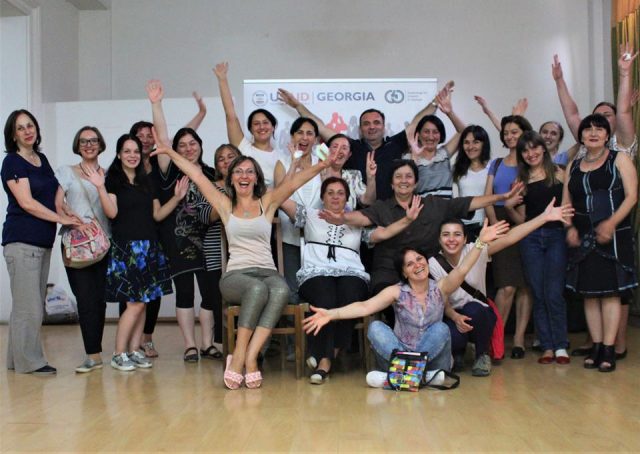
Governing for Growth (G4G) in Georgia was a five-year, United States Agency for International Development (USAID) – funded project that supported the Government of Georgia in improving the business-enabling environment. Its aim was to foster legal and regulatory reforms that are fairly and transparently conceived, implemented, and enforced through consultative dialogue. CIPE, as a subcontractor to Deloitte, led efforts to strengthen the capacity of private sector and civil society actors to advocate for such reforms.may
Through G4G, CIPE supported the development of business associations, NGOs, and think tanks through technical assistance, trainings and grants; empowered and engaged women entrepreneurs in the national public-private dialogue process; prepared youth for PPD by enhancing their policy advocacy and leadership skills; conducted capacity building activities for youth across the country; and developed an innovative startup ecosystem through local and international startup competitions.
G4G enhanced governance in a number of business-enabling areas. This included setting up an overall institutionalized framework for public consultation, evidence-based policymaking, the national energy strategy, an electricity trading mechanism (ETM), water resource management (WRM), tax enforcement and administration, customs administration and trade facilitation, insolvency, land registration, state procurement, capital markets, pension reform, innovation policy, the mining regulatory framework, building codes, and tourism policy.
The G4G approach promoted constructive public-private dialogue to ensure the effective formulation of government policies to drive economic development. This included strengthening the government’s institutional capacity to develop, implement and enforce reforms and strengthening the capacity of the private sector and civil society actors to engage the government in the development, implementation and enforcement of reforms.
G4G was able to directly advance 16 business-enabling reforms, increase the capacity of almost 6,000 Georgian citizens on economic development, engage 880 private companies and non-governmental organizations (NGO) and 17 state institutions in the implementation of the targeted reforms, award $2.5 million in grants, reach $675,500 in cost-sharing, and, as estimated by the regulatory impact assessments (RIAs), create over $2 billion in savings through the reforms.
Georgia has made incredible progress in improving its business environment and the country as a whole, which is reflected in its jump in the World Bank’s Ease of Doing Business ranking from 23rd to 6th in the world over the past ten years. In the World Economic Forum Global Competitiveness Index, Georgia’s ranking has gone from 77 to 66. The G4G project, and CIPE’s efforts, certainly played a significant role in Georgia’s progress, but there is still more work to be done to reach self-reliance and sustained economic growth.
Public-Private Dialogue (PPD) Dialogue Platforms
When G4G activities began, PPD in the policymaking process was spontaneous and ad hoc in nature. There was no legal requirement for public consultations before adopting legislation nor any established PPD practices. The few existing thematic dialogue platforms functioned in a fragmented way and private sector or civil society engagement depended on the goodwill of the leadership of the relevant public institution.
After analyzing the existing PPD practices and identifying collaborative governance gaps, CIPE, through G4G, designed targeted interventions to improve the culture for constructive dialogue, raise awareness on the advantages of policymaking through a consultative process, and showcase PPD successes.
CIPE facilitated the creation of PPD infrastructure consisting of three key components: (1) permanent dialogue platforms, (2) evidence-based analyses, and (3) PPD monitoring and evaluation systems.
CIPE helped establish and subsequently collaborated with several dialogue platforms, including:
- Economic Policy Advocacy Coalition (EPAC) – CIPE played a leading role in the establishment of EPAC which unites more than 70 business associations, chambers of commerce, and think tanks to advocate for business-enabling policy and regulatory reforms.
- Trade Advisory Group (TAG) – TAG was established as a formal PPD platform under the Ministry of Economy and Sustainable Development (MoESD) to engage the private sector in free trade negotiations, as well as to facilitate the effective implementation of existing free trade agreements.
- Parliamentary PPD Platform – In collaboration with the Economic Center (BEC), CIPE supported the creation of a Parliamentary PPD Platform to inform and educate the Members of Parliament on select policy reforms supported by G4G and to facilitate the dialogue between legislators and other stakeholders on those reforms.
- Journalists Network – CIPE created a network of economic journalists that soon evolved into a permanent journalist platform and continues to serve as an effective forum for the government and media to discuss issues. This platform ensures that journalists have a good understanding of complex policies and regulations and can report on them accordingly.
What’s Next
CIPE will continue to support the development of private sector and civil society actors in Georgia through the Economic Governance Program, funded by USAID. The Program officially launched in January and, over the next five years, will help the Government of Georgia design and implement transparent, evidence-based economic policies to improve its business and investment environment. CIPE, as a subcontractor to Deloitte, will oversee a key pillar of the project focused on private sector and civil society capacity building, building on relationships with local partners and applying lessons learned from its successful role in Governing for Growth (G4G).
Maya Eristavi is CIPE’s Civil Society Strengthening Component Lead for the USAID Economic Governance Program. Kalea Power is a Program Associate for CIPE Europe and Eurasia.
Published Date: March 20, 2020